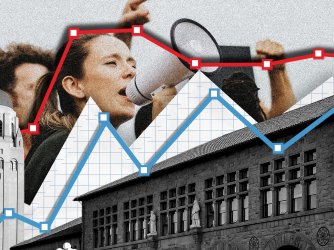Table of Contents
Not Made of Glass: How Speech Codes Harm the Ones They Were Meant to Protect
Sophia Mortensen is a FIRE Summer Intern.
No student enjoys taking exams, but I doubt any would consider their midterms or finals a form of harassment. Columbia Law School apparently disagrees—or at least it did in the 2001 case of Professor George Fletcher. For one of his exam questions, Fletcher created a hypothetical situation (based on real cases) in which a pregnant woman felt grateful for an assault that resulted in a miscarriage. In the hypothetical, she had been unsuccessfully seeking an abortion and wanted to thank her attacker for the end result. This exam question was deemed demeaning to the women in the class, and Professor Fletcher was threatened with a "a plausible contention of liability an[d] unlawfulness." While Columbia University did not punish him in the end, the case is still indicative of a greater problem on campus.
The impulse to cry "harassment" at the slightest provocations and the eagerness of universities and colleges to clamp down on any speech or action deemed offensive chills debate and inhibits inquiry. Proponents of campus speech codes argue that such codes are enacted in an effort to make campuses welcoming and civil, neither of which is a bad thing. However, as damaging as these speech codes are to the censored, I believe that they are equally harmful to the students that they aim to protect.
When universities enact a sweeping speech policy meant to protect women, minorities, gays, or any other group of students, they are implying that those students cannot stand up for themselves. They are implying that I, as a woman, would be so threatened by someone throwing a sexist insult at me that I would not be able to fully participate in my education. While I thoroughly doubt that this implication is intentional, it is there, and it is as offensive to me as any sexist comment the campus misogynist is likely to come up with.
Indeed, confronting the campus misogynist is beneficial to my educational experience. It may be generally accepted that women can participate in higher education just as well as men. But if someone asks why I believe that, I should have a coherent answer. I cannot develop a good answer until I am challenged. Indeed, having one's beliefs challenged is the core of the university experience. If graduating students believe exactly what they did in their freshman year, they have lost an opportunity to evolve as thinkers and strengthen their values.
Speaking of challenging beliefs, a debate on the merits of women in higher education is much more likely to convince the campus misogynist that I deserve to be there than any lecture from an administrator. An authority figure declaring your beliefs wrong is probably not going to lead to a change of heart. It may be scary, but that does not mean it is convincing. And more tragically, that fruitless intervention has robbed two students of the chance to better their ideas.
Even if the campus misogynist does not change their view, our debate is not a wasted exercise. If nothing else, I now know who they are and can act accordingly. A speech code would never have changed their mind, only prevented me from knowing who they were. That is probably more harmful in the long run than an argument. And if I do not convince them of my position, their presence on campus does nothing to lessen my educational experience.
But if all this is true, then why do students complain? Why did students object to Professor Fletcher's exam question? I think this is due to what author Jonathan Rauch calls an "offendedness sweepstakes." It creates a race to see who has the thinnest skin and thus can regulate speech for everyone. And, unfortunately, many people will likely want to be that regulator. In any system that claims to value freedom and inquiry, no one can have the right not to be offended by someone else's speech. Acting as if someone does only stifles discourse.
I do not mean to imply that real bias and harassment (racial, sexual, etc.) do not exist. They do, and no one should have to endure them. But there are laws, policies, and procedures in place to deal with them. Schools should focus on making those systems as strong as they can be without sacrificing protected speech. Speech codes do not help the oppressed classes; they simply create new ones.
Recent Articles
FIRE’s award-winning Newsdesk covers the free speech news you need to stay informed.

A third of Stanford students say using violence to silence speech can be acceptable

Stanford president and provost cheer free expression in open letter to incoming class

FIRE survey shows Judge Duncan shoutdown had ‘chilling effect’ on Stanford students
